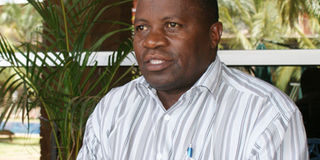PROJECT SUCCESS: Like father like son

SMART: Eng. Kisembo and his son have previously topped national exams. PHOTO BY ISAAC KASAMANI
What you need to know:
According to Eng. Kisembo, while he did not perform spectacularly well in his senior six exams, he qualified to pursue a bachelors’ degree in engineering at Makerere, which he completed in 1984.
In Part VIII of Project Success, we trace Bernard Kisembo, the best O’ Level student in East Africa in 1976. Now an engineering consultant, Eng. Kisembo tells his story to Benon H. Oluka
Eng. Bernard Kisembo, 52, remembers with pride the time in early 2007 when he received a call from a journalist frantically asking for his whereabouts.
“Your son is one of the best in the country,” he remembers the journalist saying. “We want to interview you.”
That son is Henry Mutegeki, then of St. Mary’s College, Kisubi, who scored four As in his A-Level exams. He is currently in his third year at Makerere University pursuing a bachelor’s degree in electrical engineering.
Eng. Kisembo’s son was not swimming in unchartered waters; he merely followed in his father’s footsteps.
In 1976, while at Ntare School in Mbarara District, Eng. Kisembo emerged the best student at O-Level in the East African region with nine aggregates in eight subjects.
Contrasting the media frenzy that accompanies the release of results by the Uganda National Examinations Board (Uneb) now with the situation in his time, Eng. Kisembo chuckled and said; “At that time, I was deep in my village in Fort Portal. Who would come looking for you in the village?”
In the same year, Ntare also produced the second best student in East Africa, Livingstone Bangi, who had also emerged the country’s second best PLE student of 1972.
Mr Bangi, now a leading engineer, served as President of the Uganda Institution of Professional Engineers in 2004/05.
Ntare culture
“In Ntare when we were reading, we were not reading as individuals. We were reading as a school because we knew the school had to be the best. So even if we would compete amongst ourselves internally, we knew that we were competing against the whole country,” said Eng. Kisembo.
According to Eng. Kisembo, while he did not perform spectacularly well in his senior six exams, he qualified to pursue a bachelors’ degree in engineering at Makerere, which he completed in 1984.
Having focused his energy on studying the practical aspects of electrical engineering, including a training stint at Hima Cement, Eng. Kisembo got a job even before he graduated.
“Nile Breweries was looking for electrical engineers. They contacted the faculty and the faculty sent two of us to do an interview. My colleague had done electronics so it was to her disadvantage because they wanted someone who had done power systems. They took me,” he said.
Eng. Kisembo worked at Nile Breweries till 1991, when he moved to Power Engineering Ltd in Jinja District as technical manager.
Consultancy stint
He then moved to Gauff Ingenieure, a German consulting engineering firm till June 1998 when he joined Multi Konsults, which is headed by his former university supervisor, Dr. Abel Katahoire.
Eng. Kisembo, who has been the lead consultant in the redesign and upgrade of power units at Crested Towers and Social Security House in Kampala, as well as Entebbe International Airport arrivals and Departures Lounges, believes the tutoring of engineers should be changed to focus on practical training.
“My experience is that we study a lot of things at the university, which is good because the syllabus measures up to international level. But I think there should be more emphasis on things that are relevant in the field. We tend to concentrate more on theory than what is actually required in the field,” he said.
“What happens is that when you come out of university, you are taken up by a company and, although you have the theory and intelligence, they have to teach you afresh when it comes to the way things are done in the field,” he added.
He believes the experience he has gained in the field, along with the short courses he has done at different times in his career, are sufficient.
“I have been going for short courses. I didn’t go for a masters,” he said. “I want to concentrate on my life, make money and build my family because when I was a student at Makerere I got two children so I have to look after them.”
Both of those children are now at Makerere pursuing electrical engineering, which speaks volumes of the impact that Eng. Kisembo’s love for a profession he describes as exciting has had on his own children.




